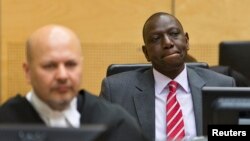The International Criminal Court is allowing Kenyan Deputy President William Ruto to return home so he can help deal with the militant attack on a Nairobi shopping mall.
Judges on Monday gave Ruto a one-week leave from his trial on charges of crimes against humanity.
At a hearing Monday, defense lawyer Karim Khan said the deputy leader is needed at home to take part in security briefings and consultations.
"It is essential, we say, for William Ruto to go back. One wouldn't have expected, or the world would have found it intolerable, if the president and the vice-president of the United States were not in the country after 9-11. Well, this is Kenya's 9-11 and it is absolutely essential, for law and order, for assisting the president to resolve the situation."
As he left the building, Ruto told reporters that both he and President Uhuru Kenyatta are committed to the participating in court proceedings, but that the current crisis in Kenya underscores the difficulty in attending the whole trial which is expected to last for several months.
"We hope that some people will begin to contextualize what is going on and begin to appreciate the challenges that Kenya is going through, the region is going through, and the complications that are brought by what is going on here."
Ruto went on trial September 10 in The Hague on charges he orchestrated ethnic violence after Kenya's disputed 2007 presidential election. Both he and his co-defendant, radio executive Joshua Sang, have pleaded not guilty.
At least 68 people were killed and dozens wounded during an attack by Islamist militants on a Nairobi shopping mall that began Saturday.
Judges on Monday gave Ruto a one-week leave from his trial on charges of crimes against humanity.
At a hearing Monday, defense lawyer Karim Khan said the deputy leader is needed at home to take part in security briefings and consultations.
"It is essential, we say, for William Ruto to go back. One wouldn't have expected, or the world would have found it intolerable, if the president and the vice-president of the United States were not in the country after 9-11. Well, this is Kenya's 9-11 and it is absolutely essential, for law and order, for assisting the president to resolve the situation."
As he left the building, Ruto told reporters that both he and President Uhuru Kenyatta are committed to the participating in court proceedings, but that the current crisis in Kenya underscores the difficulty in attending the whole trial which is expected to last for several months.
"We hope that some people will begin to contextualize what is going on and begin to appreciate the challenges that Kenya is going through, the region is going through, and the complications that are brought by what is going on here."
Ruto went on trial September 10 in The Hague on charges he orchestrated ethnic violence after Kenya's disputed 2007 presidential election. Both he and his co-defendant, radio executive Joshua Sang, have pleaded not guilty.
At least 68 people were killed and dozens wounded during an attack by Islamist militants on a Nairobi shopping mall that began Saturday.





